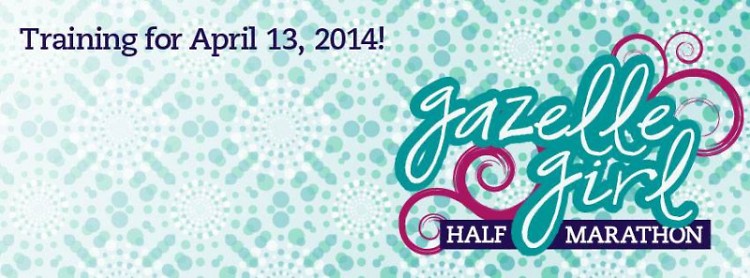March Madness may be coming to a close, but for runners training for spring races, Marathon Madness is in full swing. Eat, run, rest, repeat is the mantra for many gearing up for the starting line over the course of the next several weeks, and for any runner that has pushed themselves to train for a new distance — whether it be a 5k or 50k — they know intimately the importance of getting high quality nutrition to fuel their training and performance.
Everyday hydration and nutrition is an important part of every racer’s training plan. It will fuel training sessions, shorten recovery time and help build and strengthen muscles and the racer’s immune system. Gazelle Girl runner and registered dietitian, Jessi Boehme, weighs in on her nutrition trips for training smart and running your most strong race this spring.
Nutrition/Hydration 101
Q: Runners frequently joke that they can eat whatever they want because of the munchies or that they are training for a marathon. How many calories should a runner be focused on to fuel their training?
A: Focusing on calories is a tough question because a number will vary for everyone’s specific body type and goals. A good rule of thumb is to refuel after a run with a liquid carbohydrate right away (i.e. a serving of Gatorade, a carb gel + water…) then wait 1 -1.5 hours to eat a balanced small meal of protein, fat, and complex carbohydrates.
Q: What should a balanced diet of carbs, protein and fat look like for a runner in training for a half or full marathon?
A: That’s just it…balanced! Picture your plate at every meal; fill half with fruits and vegetables, one third with a whole grain, one fourth with a lean protein source and a side of dairy. Snacks should focus on a protein paired with a fruit and/or vegetable. It shouldn’t look like milkshakes from McDonalds and as many pastries as you want just because you’re a runner in training. Celebrate your runs with healthy carbohydrates, proteins and fats to keep you moving forward.
Q: What are some of your favorite go-to carbs, proteins, and fats that are staples of your trainings?
A: Carbs: Whole grain English muffins, quinoa, and oatmeal – then of course any fruit or vegetable that sounds appetizing to me. Proteins: Non fat plain Greek yogurt, black beans, almonds, crab meat, eggs, and powdered peanut butter (mix it in your oatmeal or even your quinoa) and tofu. Fats: avocados, walnuts, eggs, and once in a while I’ll make salmon cakes (salmon, pumpkin pureed and other ingredients).
Q: What are some good strategies for those long distance runners with special dietary considerations, food intolerances or allergies that may have to get creative to fuel their training? (Thinking those who are celiac, auto-immune gluten free, vegan, allergies).
A: The best thing is to know WHY you’re eating the way you are. Is it because of medical reasons or personal. Do your homework and get in contact with your doctor and a Registered Dietitian who can help you navigate food choices. Don’t think you can’t eat anything. There are tons of options out there, especially now, for people with different dietary considerations. Keep an open mind towards trying new things and keep a food diary to see what works and doesn’t work for your body. You can also use your food diary to see what food groups you struggle getting a variety in the most…that way you can ask a specific question to your doctor or dietitian.
Q: How important is daily hydration for a runner and why? How can a runner know she is properly hydrated?
A: On average a woman needs approximately 9 (8-oz) cups each day (without added physical activity needs). A man needs 12.5 cups. Hydration is important because it keeps your body in a harmonious state of homeostasis. A runner or anyone who sweats (everyone!) loses water from their body and needs to replace this in order to not get dehydrated. It is especially important to stay hydrated during the day for a runner so not to “bonk” out during their runs and risk injury or hospitalization. It also helps keep your digestive system moving properly
An easy way to know if you’re hydrated or not is to check out your urine. If it’s clear, great. If it’s yellow, dark yellow or even brown…you’re dehydrated to an extent and need to refuel with water. Other jobs water has in our body: carries nutrients to cells, helps kidneys by flushing out waste, regulates body temperature, keeps tissues moist, protects your organs and lubricates joints. Put a reminder in your phone if you have a hard time remembering to drink water throughout the day.
Q: What role can vitamins and supplements play into a runner’s overall nutrition plan?
A: My personal opinion – I believe vitamins and minerals should come from food. It’s natural and no one in a laboratory had to extract something only to put it in a pill form. You absorb nutrients through your food better than any supplement. The only “supplement” I believe people use and I like to also use are carbohydrate gels/fuels.
Long run and Pre-Race Nutrition
Q: Why does a runner need to consider taking in additional nutrition for longer runs and races?
A: Think of carbohydrates as glucose (one of the main forms we eat) that our brains and muscles need in order to function. Most of the glucose we eat is stored as glycogen in our muscle and liver. However, during a run when you use up the stored glycogen, your brain and muscle still need fuel. Without refueling with carbohydrates, you’ll bonk out because you’re running out of carbs. Having carbs during a long run minimizes the risk of “hitting a wall” and keeps your blood sugar level normal.
However, keep in mind that you should experiment with what fuels you best during a long run. For some people it’s carrying a carbohydrate gel like a Gu or drinking a serving of Gatorade. Sometimes during my long runs I carry a banana with me and snack throughout my run so my stomach doesn’t get upset.
Don’t get to a race day and take the first carbohydrate replacement they offer if you haven’t ran with it before, your stomach might not thank you.
Q: There are a lot of various products on the market for long run nutrition — from gels to beans to chews to drinks. How does a runner find the perfect combo of fuel for running long and for race day? And for hydration? Are all sports drinks created equal? Why or why not — how does a runner find the perfect drink supplement for to hydrate their run? What should they be looking for?
A: Long question! It’s tough and very individualized. For me I tried a variety of beans, gels, chews, beverages on the days of my long runs. This resulted in some good feelings and some oh my word I need to run to the woods feelings. That way I knew if they worked for me or not. However, it’s important with any and all of them to follow the bean/chew/gel with a serving of water. Otherwise your body pulls in water to your stomach TOO quickly and results in diarrhea. They should also look for carbohydrate gels/chews/drinks that have glucose or maltodextrin which tend to be digested easier. Ones that focus on fructose are not digested as easily.
Sometimes it’s the amount that you eat…your body may not need the 6 Clifbar Chew blocks that come in a pack, you may only need 2-3. It’s all about experimentation and writing down what works for you.
Q: If a runner prefers to not use processed nutrition like gels, what are some real food alternatives that offer the carbs, sugar and salt a runner may need on their long run and races?
A: I’ve heard of long distance runners drinking some pickle juice for electrolytes but I wouldn’t recommend this to an unseasoned runner who has never used it. I like using bananas, avocados (yes, mid run) and almonds. Simply because I know how my body handles them. Some things to keep in mind is watching the fiber content of a “real food” you eat mid run, too much fiber will cause gastric upset.
Q: How can runners use their long training runs to test out race day nutrition and hydration?
A: Eat and drink what you want to try out for race day. Time it the same each run to see how your body reacts.
Q: What are your nutrition tips for the racer a week out before the big day? And the night before?
A: I’m not a fan of HUGE CARB LOADING the night before a race. Yeah, I’ll eat some pasta but I remember to eat some lean protein and healthy fat as well. As far as a week out from race day…I don’t change anything. I do exactly what I’ve been doing so I don’t change my body’s reaction times to the food I eat. As far as the day of …you have to consider that you’re going to have adrenaline that can do all kinds of things to the body unfortunately. Try to keep calm (as best you can) and stick to what you’ve been doing in your training. If you feel a gastric upset episode coming on, get your mind off of it by talking with another runner or focusing on music/breathing so that your stress doesn’t make it worse.
Gazelle Girl Half Marathon & 5k training plans are available online (download the plans) and get the miles on your calendar to help keep your training on schedule. Need a training partner? Consider signing up for the Priority Health Run Camp to support your training goals. This is a great opportunity for new and experienced runners alike to train with a group at their ability level for the Gazelle Girl Half Marathon, the 5k, and The FifthThird Riverbank Run. Remember, there is never the wrong weather- only the wrong clothing (read Gazelle's tips on layers for winter running HERE). For Gazelle Girl Half Marathon & 5k registration information, click HERE. The Rapidian is a proud media sponsor of the event, and commends the race's effort to stay hyperlocal in their work to promote healthy lifestyles for women and girls in the Greater Grand Rapids area.
The Rapidian, a program of the 501(c)3 nonprofit Community Media Center, relies on the community’s support to help cover the cost of training reporters and publishing content.
We need your help.
If each of our readers and content creators who values this community platform help support its creation and maintenance, The Rapidian can continue to educate and facilitate a conversation around issues for years to come.
Please support The Rapidian and make a contribution today.

